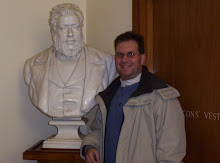
This Sunday, I continue in the sermon series entitled Mark(ed) by the Gospel with the opening section of Mark 2. I have always enjoyed this particular passage for it surprises and the vividness of its narrative. I still remember a sermon that Charles Roesel preached on this passage during a chapel service when I was at NOBTS.
In my study this week I have been trying to understand the theological implications about Jesus' announcing the forgiveness of the man's sins. The man does not ask for this forgiveness. There is no direct evidence in the text that this was on the man's mind. In fact, we know less about this man's faith and thoughts than anyone else in the text.
Are we to make assumptions about this man's heart based on Jesus' response? Or do we see this as a time that Jesus' purpose is larger than any other issue in play? Does this teach us anything about the forgiveness of sins or was it simply a unique event with little theological echo? The passage has left me curious.
Yet I feel alone in my curiousity. Out of 5 commentaries, a NT dictionary and my favorite systematic theology, none even began to address these issues.
A few of the commentaries discussed the relationship between sin and disease. But that seems secondary in this passage. The man was clearly not healed when his sins were forgiven. And Jesus Himself makes no particular effort to emphasize this relationship in the text we are provided.
What I do know is 1) that is if Jesus were to fix our greatest need, we would often be surprised by what that was. 2) Sin is a bigger issue than we ever really come to terms with. 3) Jesus is the Son of God.
If you can help with the rest, please let me know!







2 comments:
A good question, and like you said, most commentaries fail to even try to answer the hardest questions.
I think that although Jesus was concerned with the man's illness, He knew what was really bothering the man and those carrying him, his sin. So just as Jesus knew what His enemies were thinking, He knew what his friends, including the sick man, were thinking also.
I also wonder about this conversation about Jesus seeing the other men's faith and forgiving the man. It may be that this was one of those situations where God made a special exemption (which also bothers me a little).
It may also be like Peter and John being asked for money but gave the man healing (Acts 3).
I'm probably no more help than the commentaries.
Thanks for your thoughts. We seem to have similar thoughts and questions. (Which surprises me about the silence of the commentaries.)
I enjoyed preaching it but I may not ready to build an entire theology out of this passage.
Post a Comment